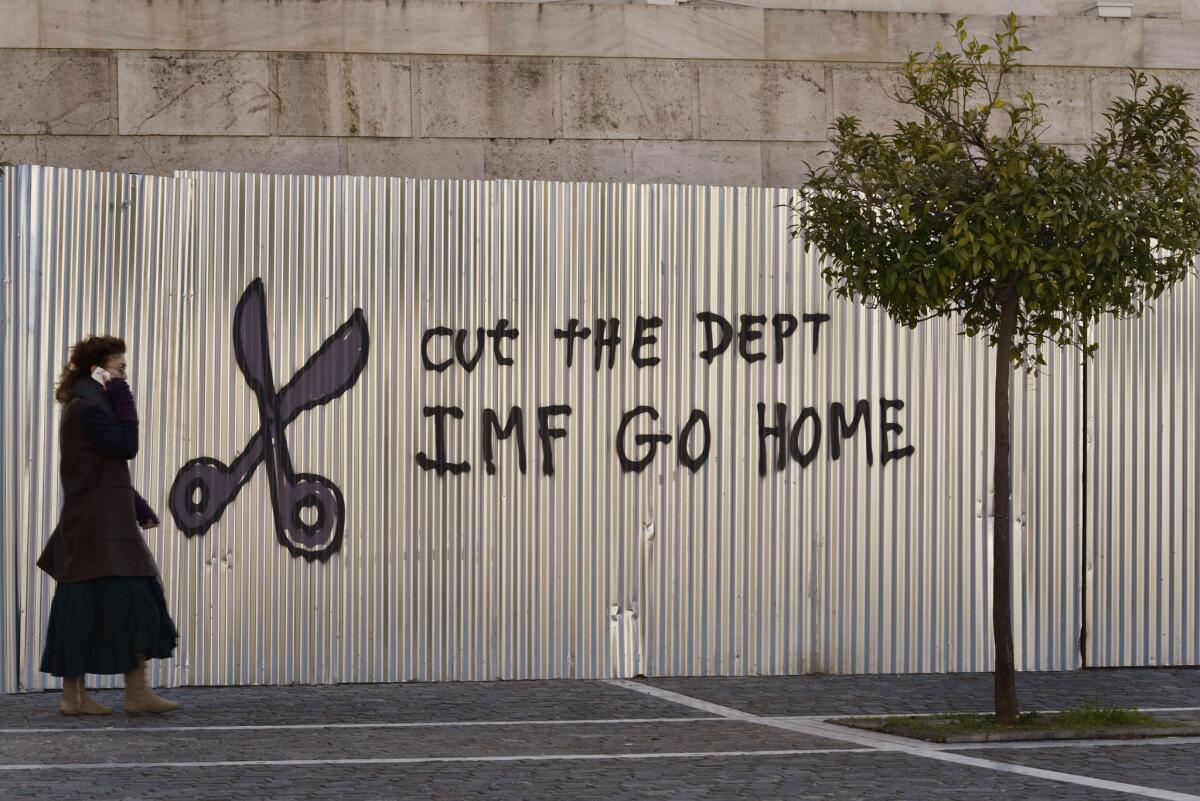Eurozone ministers give Greece a four-month bailout extension

Greece prevailed Friday in a high-stakes standoff with European creditors, winning a four-month extension on its debt repayment plan after threatening to default and plunge the entire 19-nation Eurozone and global financial markets into crisis.
The meeting of Eurozone finance ministers in Brussels had been billed as a make-or-break session on Athens’ future as a member of the common currency alliance, with Germany and other leading economic powers on the continent insisting that the new leftist Greek government live up to its predecessors’ commitments.
Greek Prime Minister Alexis Tsipras won election last month on a promise to alleviate the painful austerity measures imposed in exchange for the $274-billion bailout, vowing to put laid-off workers back on the government payroll and to “reclaim national sovereignty” over the country’s budget.
Accounts of the standoff from government officials and news reports have cast Greeks as victims of mirthless Germans’ frugality, enhancing a bitter cultural divide between the Eurozone’s more prosperous northern members and the poorer residents of the Mediterranean member states.
Default would have led to a run on Greek banks and a shortage of funds to cover what is still a bloated government payroll, inciting panic and economic chaos in a country that has suffered a 25% economic contraction over the last five years.
But the specter of a Greek default and cutoff by Eurozone compatriots had rattled global markets. Leaders of the creditor nations were reminded of the blow to be expected to the collective European Union economy if Greece was forced out of the Eurozone in what investors might perceive as heralding failure of the historic experiment in economic union.
Word from the Brussels gathering that a deal was in the offing to at least delay the Greek crisis sent the Dow Jones industrial average and benchmark S&P 500 to new highs. The euro rebounded a bit to $1.14 and Germany’s DAX index closed at a record high.
Details of Athens’ bailout extension request remained unclear, but in a major concession, the Tsipras government had promised going into Friday’s meeting to honor the current bailout terms, called Master Financial Assistance Facility Agreement, in exchange for the easing of certain austerity measures that have imposed brutal hardships on many Greeks. The unemployment rate has surged to 27% and one in three businesses has gone bust since the nation’s economy slid off the fiscal cliff in 2009.
Athens has also accepted continued supervision of its finances by creditors, in spite of Tsipras’ campaign trail vows to rid Greece of the indignity of foreign oversight.
“This deal marks the first step of a new direction [for Greece]. It leaves austerity behind and turns Greece into a coauthor of reforms that will do away with age-old malignancies in our system,” said Greek Finance Minister Yanis Varoufakis.
“We bent our positions a bit,” said Elena Panaritis, a Greek economist involved in the negotiations. “But it’s clear that they want us to bleed a bit more.”
The agreement followed a flurry of talks among Varoufakis, his German counterpart Wolfgang Schaeuble, International Monetary Fund director Christine Lagarde and Jeroen Dijsselbloem, the Dutch finance minister chairing the eurogroup.
“It has been a very laborious but eventually constructive process,” said Lagarde, visibly tired.
It was apparent that few, if any, of the points of contention have been resolved between the Greek government and the rest of the bloc. Athens had demanded a six-month extension of the bailout, which expires Feb. 28, a concession that Eurozone leaders had suggested just a day earlier was unacceptable and a bad precedent for other euro borrowers.
Athens has until Monday to produce a detailed list of reform measures it plans to take in return for the sustained aid package, Dijsselbloem said.
The measures will be discussed by the finance ministers in a conference call Tuesday and reviewed by Greece’s troika of creditors — the European Commission, the IMF and the European Central Bank — “to assess if they are comprehensive enough” for the interim funding to proceed, Dijsselbloem told reporters.
The meeting Friday was the third attempt in 10 days to settle a standoff that threatens to leave Greece without money within weeks. Without fresh infusions of cash, the government would be confronted with a choice of halting interest payments and pay for government workers and pensioners or printing the old drachmas and setting in motion a steep inflation spiral.
Some European finance officials, including bankers, believe Greece’s default and exit from the euro are inevitable.
“One gets the impression that the Greeks are just looking for a way out,” an unnamed central banker told the German newspaper Frankfurter Allgemeine.
Tsipras and his radical leftist Syriza party surged to power last month promising to rewrite Greece’s loan agreement with creditors. Opinion polls show his popularity rocketing to 75%, although Greeks overwhelmingly want to stay in the Eurozone. Leftist political leaders have told Greek voters for years that they can have it both ways: control over their own finances and use of the euro, which is guided by strict rules to protect its collective value.
Late Friday, hundreds of people swarmed the capital’s central square to cheer on the government.
“What more do these creditors want?” said Maria Stefanidou, waving a Greek flag. “How much more do they want the Greek people to suffer? Win or lose, what matters is that this government is finally saying ‘no’ and doing something to reclaim our national pride.”
Special correspondent Carassava reported from Athens and Times staff writer Williams from Los Angeles.
More to Read
Start your day right
Sign up for Essential California for news, features and recommendations from the L.A. Times and beyond in your inbox six days a week.
You may occasionally receive promotional content from the Los Angeles Times.






